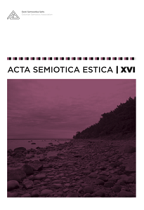Bernardo Bertolucci film “Konformist” Nõukogude Liidus: kuidas loob tsensuur uue teose?
Bernardo Bertolucci’s The Conformist in the USSR: How does Censorship Create a New Film?
Author(s): Tiina HoffmannSubject(s): Recent History (1900 till today), Psychoanalysis, Fascism, Nazism and WW II, Film / Cinema / Cinematography, Translation Studies, Italian literature
Published by: Eesti Semiootika Selts
Keywords: censorship; film translation; dubbing; adaptation; film reception; ideology; psychoanalysis; Bertolucci;
Summary/Abstract: The article analyses Bernardo Bertolucci’s screen adaptation (1970) of Alberto Moravia’s novel “The Conformist” in comparison with the censored version of the film released in the Soviet Union in 1976. Attention is paid foremost to the dubbed Russian version’s visual cuts and translation shifts, which amount to the creation of a new, castrated version that is approximately 30 minutes shorter than the original film and that ideologically corresponds to the then-dominant Soviet discourse of representing fascism. The article demonstrates how in this new, censored version where Bertolucci’s complex narrative is transformed into a linear narrative (that surprisingly makes it closer to the original novel by Moravia), the characters’ psychological inner worlds and Bertolucci’s storyworld conveyed through images, sounds and language have become lost in translation.
Journal: Acta Semiotica Estica
- Issue Year: 2019
- Issue No: 16
- Page Range: 114-141
- Page Count: 28
- Language: Estonian

